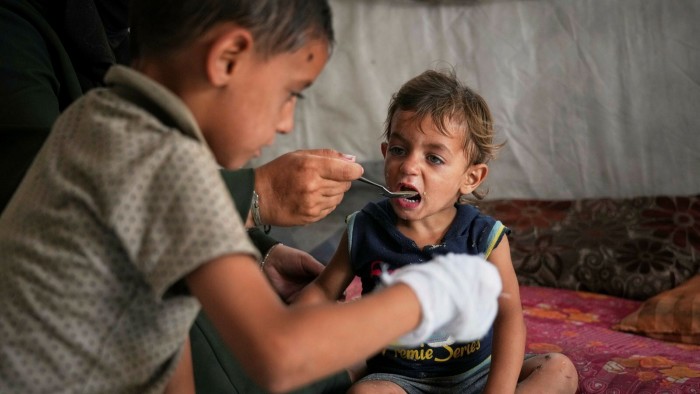Unlock the Editor’s Digest for free
Roula Khalaf, Editor of the FT, selects her favourite stories in this weekly newsletter.
The writer is a public health expert and trustee of a philanthropic foundation in Israel
My adult life has largely been defined by two identities. I am a Zionist, whose family has deep ties to the state of Israel. I am proud of the role my family played in the development of Israel. By profession, I am a nutritionist who has worked with humanitarian groups in war-torn countries where access to food is in scarce supply.
Until now, these two worlds have remained largely distinct from each other, but to my horror they have collided. Children in Gaza are starving because Israel’s current government deliberately chose to prevent humanitarian supplies entering the strip for 77 days. The announcement on Sunday evening that “minimal” aid flows would resume to prevent a “hunger crisis” is an admission that famine is the inevitable outcome of preventing the entry of humanitarian aid.
Hamas committed unspeakable acts of violence on October 7 2023. Its brutal onslaught against Israelis killed over 1,200 people. Its decision to take more than 250 hostages — 58 remain in captivity, of whom 35 are no longer alive — callously disregarded Israeli lives and those of over 2mn Palestinians in Gaza. By cynically using civilian infrastructure, stealing aid for its fighters and demanding allegiance from people under threat of death, Hamas showed that it views Palestinian civilians’ lives as expendable.
However, none of this misery is the fault of the children of Gaza, where almost half the remaining population is under 18, an age group at higher risk of death from malnutrition. No child anywhere should be deliberately deprived of food and no child should be forced to starve. And yet, the Israeli government’s decision to block all aid since March 2 until its announcement on Sunday was, in practice, a decision to make innocent civilians pay the price for Hamas’s actions, which they have no control over and no freedom to challenge — assuming they’re even old enough to do so.
In my career as a nutritionist, I have met and talked to many malnourished children and their mothers in countries ranging from Sudan to Myanmar. As a mother, you are forced to watch helplessly as your child weakens and succumbs to trivial diseases because their immune system has been fatally compromised. Or they die of heart failure.
Many people ask me how it is possible to know that anyone is really starving in Gaza. Indeed, with foreign journalists having been denied entry by Israel since the start of the war over 19 months ago, we can’t rely on the media to fact check. However, there is plenty of data from humanitarian organisations.
The latest reports from the Integrated Food Security Phase Classification, a UN-backed programme, found that one in five Gazans was facing starvation. If food supplies don’t increase significantly, nearly 71,000 children under the age of five are expected to be acutely malnourished over roughly the next year with rates of acute malnutrition (the type that kills children quickly) rising.
Some people don’t believe these figures, which are also denied by the Israeli government. But malnutrition is not rocket science. If there is no food going into a place, and if there is no food being grown in a place, then what do people eat? And if people don’t eat, then they become malnourished. We don’t yet know how much aid will be allowed to enter Gaza. But if news reports are correct, supplies will be limited, difficult to distribute and specialist food needed by those already suffering from malnutrition might not reach them.
I imagine myself as the desperate mother of young children in Gaza whose husband has died. How would I feed them? Would I sell myself? Would I rent out my children to Hamas to deliver messages in exchange for food? Would I risk walking towards IDF soldiers along the border to beg?
Israel’s government is not the first to withhold humanitarian aid from a population during wartime. The Allies blockaded Germany from 1914-1919. Germany and Finland besieged Leningrad during the second world war. But it is the horrors of the first and second world wars that resulted in a set of international laws and treaties preventing us from repeating these kinds of acts.
War inevitably dehumanises people — and the Israelis and the Palestinians are by no means unique in this regard. But that’s precisely why we have an international rules-based order to ensure there are limits to the worst excesses of war.
By first withholding aid and then agreeing to resume only limited humanitarian supplies to Gaza after facing significant external pressure, the current government of Israel is endangering what’s left of its moral authority. No one should ever make the choice to allow children to starve.
